Katy Barnato
Source: Drought, mudslinging casts gloom on South Africa
Prospects for Africa’s second-largest economy looked gloomy on Friday, after the central bank hiked interest rates at a time of slumping economic growth, drought and a political power battle.
Faced with the coupling of a worsening growth outlook and inflationary pressures, the South Africa Reserve Bank opted to hike the repurchase interest rate by 25 basis points to 7 percent. The bank also cut its prediction for growth in 2016 and 2017 to 0.8 percent and 1.4 percent respectively.

As a drought intensifies food price pressure, inflation is seen averaging 6.6 percent this year, having jumped to 6.2 percent in the year to January. The drought is one of the worst on record, necessitating imports of key crops and pushing up food prices, as well as leading the government to reallocate spending to provide drought relief.
Earlier this month, Moody’s Investors Service placed South Africa’s “Baa2” rating on review for downgrade. A cut of two notches or more would take South Africa’s rating to non-investment or “junk” grade, a judgment on the country’s ability to repay lenders. This could sharply hike the nation’s borrowing costs and cast doubt on its policymakers’ ability to manage the economy.
Rival agencies Standard & Poor’s and Fitch rate South Africa at “BBB-“. That’s equivalent to a Moody’s rating of “Baa3” and only one notch off junk territory.
Graft allegations
The economic fears come as a crisis envelops South Africa’s ruling elite. A well-known business family with ties to President Jacob Zuma stands accused of exercising undue influence over political appointments.
The latest complainant is the former boss of South Africa’s state-run power firm, Eskom. On Friday, South Africa’s Mail & Guardian newspaper cited Zola Tsotsi as saying that he had been pushed out of his role by the Gupta family for “not playing the game.”
The Indian-born Guptas were also accused this week of offering cabinet posts to two politicians of the ruling ANC, according to media reports.
Deputy Finance Minister Mcebisi Jonas said on Wednesday that the Gupta family had offered him the role of finance minister, shortly before Nhlanhla Nene was sacked from the position in December, according to Reuters.
The Guptas have denied trying to influence political appointments, the news agency said.
The removal of Nene saw the South African rand depreciate sharply and piqued investors’ concerns about the government.
Now, the longevity of Nene’s successor as finance minister, Pravin Gordhan, seems precarious.
“It seems that Gordhan has never been fully accepted in his post and we would not be surprised if he were eventually pushed out. To state the obvious, markets would not take that well,” Win Thin, head of emerging market currency strategy at BBH, said in a note on Wednesday.
Follow CNBC International on Twitter and Facebook.